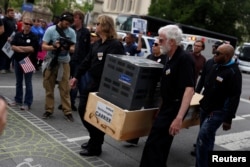If you visit Sully's Bar and Grill in West Indianapolis most afternoons, its parking lot is usually a hive of activity, thanks to the large number of workers from the nearby Carrier manufacturing facility who make up much of the restaurant's regular crowd.
For many Carrier employees, Sully's is a place to grab some food and relax. On this rainy afternoon, the front step of Sully's is a temporary refuge for Robert James and Vickie Burress.
They routinely meet in front of Sully's, where they share cigarettes and conversation before starting the night shift. Much of the conversation revolves around their steady, well-paying jobs at the Indianapolis plant, right across the street.
"It was one that I was looking forward to retiring from," said James, who has worked at the plant for 18 years.
"Carrier, as far as producing furnaces and different things like that, we were number one," he explained. "So we never felt that this was something that we had to worry about."
What he's worried about is the subject of a YouTube video posted in February that now has had more than 3 million views. The video documents the moment managers from Carrier and its parent company, United Technologies, told some of the 1,400 employees at the plant that the facility was moving to Mexico — and with it, their jobs.
In the video, workers in the crowd become upset and vocal during the announcement.
James says he was at home when it happened, and found out by text message from a co-worker. He's angry at the way the company told its workers.
"Carrier has shown a lack of respect for everybody," James said.
Plight of manufacturing jobs
"It went viral," added Chuck Jones, president of United Steelworkers Local 1999 in Indianapolis, the union representing Carrier workers.
"A lot of media got involved … that wouldn't have got involved otherwise," he said, adding that the media coverage helped draw attention to the plight of manufacturing jobs not just in Indianapolis, but across the country.
He blames the decision for Carrier to move the plant to Mexico on the 1994 North American Free Trade Agreement, or NAFTA, and believes the pending Trans-Pacific Partnership agreement, or TPP, is even worse — and will result in more job losses.
"It's a horrible trade agreement,” Jones said. “It's NAFTA on steroids."
James is also critical of NAFTA.
"I blame the corporate people, and I blame the trade bills," he said. He also directs some anger at former President Bill Clinton, who signed the NAFTA agreement into law.
"I place the blame on Bill Clinton, I don't place the blame on Hillary Clinton,” James said. “She was the wife, she was the first lady."
‘Betrayed’
But James is concerned about Hillary Clinton's support for the TPP when she was secretary of state. In previous elections, James voted for President Barack Obama, believing he would protect manufacturing jobs in the U.S. But Obama's support for the TPP is causing him to think twice.
"I feel very betrayed by President Obama," he said. "One thing I did not expect from him was a trade bill."
The loss of manufacturing jobs and trade agreements is a top concern among many voters in Indiana ahead of the state's May 3 primary election.
"Carrier has become a poster child, and we've been thrown into the mix," said James, who acknowledges the role Carrier's Indianapolis plant is playing in the presidential campaign.
Trump weighs in
It is a topic Republican front-runner Donald Trump has seized upon.
"When Carrier, that left here, goes to Mexico," Trump told a crowd of supporters in Indianapolis, "and they want to sell their product, across the border, and no tax, no nothing, we're going to say, 'Sorry, folks!' "
Jones is happy the issue continues to come up during Trump's campaign appearances.
"We really appreciate him doing that. It's really getting the message out," Jones said.
It’s a message that resonates with workers like James.
"As Trump said, if these companies were taxed you wouldn't see these things happen as much, if they had to pay a tax to bring these things back into the United States to sell it," James said.
But that doesn't mean James will vote for Trump on May 3.
"My vote will be the same. I've always voted Democrat," he said without hesitation. "Voting for Trump is just not me."
Starting over
As he takes a last puff from his cigarette, a steady rain begins to fall, serving as the signal to James and Burress that the time has come to move from the front step of Sully's into their cars.
Through his open window, James talks to Burress about the night ahead, and the uncertain future. The presidential election is the least of his worries.
James realizes there's little that can be done now to save his job, and he's most concerned about how losing his job will affect his family.
"I have a wife that's ill," he told VOA. "So when this plant closes, I won't have any insurance or things of that nature."
Which means he'll need to find another job as soon as he can.
"I'm 57 years old, so it's not going to be easy for me to find a job in the first place," he said.
When the plant finally closes — projected to happen in 2019 — James will be 60, the age he had hoped to start thinking about retirement. Instead, it's the age at which he'll be starting over.
















